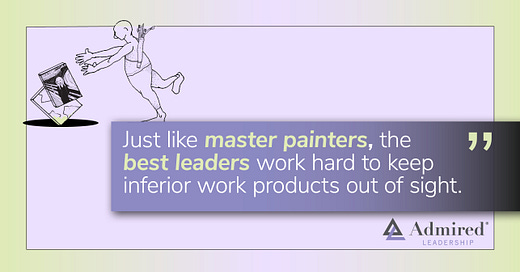At the end of her career, Georgia O’Keefe re-purchased and destroyed several of her paintings she wasn’t pleased with. Similarly, Claude Monet took a knife to 15 waterlily paintings he had created for an exhibition so the world would never see them. Michelangelo did it. So did the painter Agnes Martin. Jasper Johns was guilty, as well.
Many of the world’s most notable artists have decided to destroy or discard examples of their less satisfying work. In every field of creative endeavor, artists with a clear view of quality suffer mental anguish when their creations don’t meet their own high standards. Their solution is often to erase them.
Eradicating inferior work is a sign that the creator has very high standards and understands whether a given work meets them. By destroying a terrible work product, they erase any memories or associations related to the creation. This gives them the confidence they need to create the next masterpiece.
Physical representations play a special role in reminding us of who we are and what we are capable of. Anytime we see the shoddy work from an earlier time, it has the potential to derail our motivation and confidence to produce something great. Whenever we see a video or photograph of a bad moment, it can have the same debilitating effect.
Just like master painters, the best leaders work hard to keep inferior work products out of sight. They know too well that when team members focus on them, they begin to question their skills and talents. Once they review and learn from any representation of bad performance, like game film or process maps, they get placed in the closet and forgotten or destroyed.
By denying or ignoring the existence of past work that didn’t meet team standards, they allow others to move boldly into the future. As Garrison Keillor likes to say, “I believe in looking reality straight in the eye and denying it.”





We need to be careful when we look back at stuff we've done in the past. We don't compare it to the standards we had back then, but to the standards we hold in the present. We also forget what our skill and experience levels were at the time. What has happened in the past is what it is. The good, the not so good, and even the really bad. I agree that we should not dwell on it. But I don't think we should spend an ounce of effort trying to deny it happened or hide it from others (they will find it anyway). It happened. Accept it. Learn from it. Move on. If you're working on something today that you don't feel meets your standards, don't release it. Fix it so it does, remembering that nothing is ever perfect.